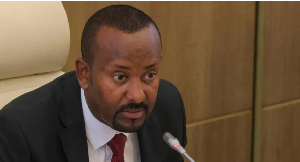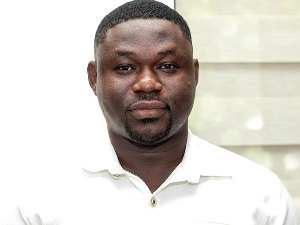Mrs Mary Adu-Boahen, wife of the sick and bedridden New Patriotic Party (NPP) presidential candidate in the 1992 elections, Prof Albert Adu-Boahen, has hit back at the children of her husband who levelled various allegations against her in a court suit recently.
Mrs Adu-Boahen, has in addition, refuted most of the claims of her foster children in response to a writ filed by the children at an Accra High Court. The 16-point reaction, which was filed on her behalf by the crack lawyers, Kocuvie Tay and Co, nonetheless, admitted that the Emeritus Professor of history is ill.
In her rebuttal, she accused the 5th plaintiff, Christopher Adu-Boahen that he once turned up at the house where Prof Adu-Boahen is being nursed and in the absence of his wife, violently disturbed him. “When his father was asleep, having been given his medicines, he had a fierce struggle with the security man, went into the house, lifted his ailing and drowsy father, placed him in a chair and started to interrogate him as to his properties.”
The defendant contended that it was her admonition of Christopher over the disturbance of his father that has caused the son to “cherish animosity against me and to cause embarrassment to his father and the newspaper publication.”
About Kwabena Adu-Boahen, the 2nd plaintiff, the defendant charged that he packed his father’s belongings, dumped them at the house of his father’s friend and left him for vacation. This was in 1993, when Prof Adu-Boahen was in intensive care at the Pennsylvania Hospital in the USA and since then “he has not set eyes on his father,” the woman went on.
The 3rd plaintiff, Cynara Adu-Boahen, who lives in London refused to visit her father when he was admitted at Cromwell Hospital in the same city until the old man’s wife sent an emissary to prevail upon her to visit him and even then she did on “very few occasions. Charles Adu-Boahen, the 4th plaintiff who also lived in London visited his father for some three times not spending more than 30 minutes each time, whiles the old man was hospitalised there for four clear months, said Mrs Adu-Boahen.
As would be recalled, in our February 27, 2002 edition, we carried a lead story titled, “Looming family crisis - Court restrains Mrs Adu-Boahen.” In that story, the five children whom Prof Adu-Boahen had in previous marriage had obtained an interim injunction from an Accra High Court to restrain Mrs Adu-Boahen from “preventing them from visiting their sick father of 69 years.”
In their submission, the children who were represented by Kwaku Adu-Boahen, claimed that they faced the unfortunate task of being prevented from seeing their sick dad by their step-mother, even though he, Kwaku, for instance, had travelled back home from the US with the sole aim of visiting his dad. “Whenever we call home to speak to our father on telephone, our step-mother would not let us talk to him,” he further told the Chronicle at the court. That hearing was on the interim injunction.
However, in her statement of defence in the substantive suit, Mrs Adu-Boahen indicated that as and when any of the five children had liked to visit their father, she has never prevented them. For instance, she stated that Charles Adu-Boahen, on returning from South Africa in December, last year, did not only visit the father but actually had dinner with him, her step-mother and her children. She stressed the plaintiffs “have had and still have access to their matrimonial home at all material times.”
Giving a little background to the Adu-Boahen’s home affairs, the defendant said they lived together with all the five children from 1975 to 1982 in her house at Ablempke where she took very good care of them all. From 1982, the children moved to the present house, which is Mrs Adu-Boahen’s with their father until 1985 when they left to live with their actual mother.
“Since 1993, the plaintiffs’ father’s illness has resulted in strict medical regimentation as to rest, sleep, physiotherapy, etc., yet the 4th and 5th plaintiffs, whenever they come to Ghana in transit and on tight schedule, have given not consideration to their father’s health but their own interest in forcefully interrupting the medical directions.
General News of Thursday, 14 March 2002
Source: Chronicle












